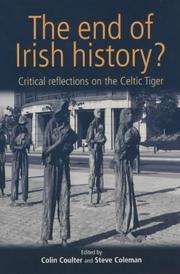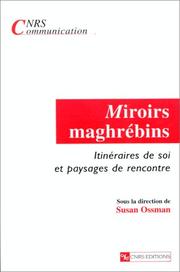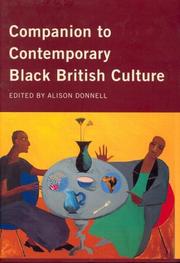| Listing 1 - 10 of 14 | << page >> |
Sort by
|

ISBN: 0719062306 9786610734160 1847790364 1280734167 1417578025 9781526137715 9781847790361 661073416X 9781417578023 9781280734168 Year: 2003 Publisher: Manchester : Manchester University Press,
Abstract | Keywords | Export | Availability | Bookmark
 Loading...
Loading...Choose an application
- Reference Manager
- EndNote
- RefWorks (Direct export to RefWorks)
Ireland appears to be in the throes of a remarkable process of social and economic change. This text scrutinizes the interpretations and prescriptions that inform the deceptively simple metaphor of the ""Celtic Tiger"".
Globalization. --- Ireland - Civilization - 20th century. --- Macroeconomics. --- Globalization --- Regions & Countries - Europe --- History & Archaeology --- Ireland --- Macroeconomics --- History --- Civilization --- Economic conditions --- Social conditions --- Economics --- economy --- ireland --- celtic --- irish --- Dublin --- Irish language
Book
ISBN: 9780674545748 0674545745 0674973984 0674973992 Year: 2016 Publisher: Cambridge, MA : Harvard University Press,
Abstract | Keywords | Export | Availability | Bookmark
 Loading...
Loading...Choose an application
- Reference Manager
- EndNote
- RefWorks (Direct export to RefWorks)
Following France's defeat, the Nazis moved forward with plans to reorganize a European continent now largely under Hitler's heel. Some Nazi elites argued for a pan-European cultural empire to crown Hitler's conquests. Benjamin Martin charts the rise and fall of Nazi-fascist soft power and brings into focus a neglected aspect of Axis geopolitics.
National socialism and intellectuals --- Nazi propaganda --- Fascist propaganda --- Europe --- Civilization --- Europe - Civilization - 20th century --- National socialism and intellectuals. --- Nazi propaganda. --- Fascist propaganda.
Book
ISBN: 0719080258 1847793126 1781702446 0719095522 9781847793126 9781781702444 9780719080258 1847797555 9781847797551 Year: 2010 Publisher: Manchester, U.K. ; New York : Manchester University Press : Distributed exclusively in the USA by Palgrave Macmillan,
Abstract | Keywords | Export | Availability | Bookmark
 Loading...
Loading...Choose an application
- Reference Manager
- EndNote
- RefWorks (Direct export to RefWorks)
This book examines the relationship between class and culture in 1930's Britain. Focusing on the reading and cinema-going tastes of the working classes, Robert James' landmark study combines rigorous historical analysis with a close textual reading of visual and written sources to appraise the role of popular leisure in this fascinating decade.Drawing on a wealth of original research, this lively and accessible book adds immeasurably to our knowledge of working-class leisure pursuits in this contentious period. It is a key intervention in the field, providing both an imaginative approach to the
Great Britain -- Civilization -- 20th century. --- Working class -- Recreation -- Great Britain -- History -- 20th century. --- Working class --- Business & Economics --- Labor & Workers' Economics --- History --- Recreation --- Great Britain --- Civilization --- Commons (Social order) --- Labor and laboring classes --- Laboring class --- Labouring class --- Working classes --- Employment --- Social classes --- Labor --- 1930s Britain. --- cinema-going tastes. --- class and culture. --- cultural history. --- leisure pursuits. --- literary studies. --- popular leisure. --- reading tastes. --- social history. --- working classes.

ISBN: 2271055628 2271128293 9782271055620 Year: 1998 Publisher: Paris: CNRS,
Abstract | Keywords | Export | Availability | Bookmark
 Loading...
Loading...Choose an application
- Reference Manager
- EndNote
- RefWorks (Direct export to RefWorks)
Cet ouvrage analyse les rapports entre identité, médias et liens sociaux au Maghreb. Quels modes ou modèles de comportements – individuels ou collectifs – peuvent-être adoptés ? Qui peut les revendiquer ? Quels rôles jouent la nation et la religion dans l’adoption de telle ou telle pratique ? Comment parler de la tradition aujourd’hui… ? Ces questions traversent les présentes contributions, issues d’un travail collectif mené à l’Institut de recherche sur le Maghreb contemporain entre 1993 et 1996. Les thèmes traités – citons la presse dans le Tanger cosmopolite du début du siècle, la reconfiguration des liens familiaux par la télévision tunisienne au cours du ramadan, ou encore l’analyse des vêtements « islamiques » – offrent des réponses détaillées et nuancées à ces interrogations. Les lieux, par ailleurs, marquent leur importance, autant par leur histoire spécifique que comme vecteurs de sociabilité. Les liens qui s’y développent, à l’instar des vies qui s’y expriment, inscrivent ainsi des itinéraires où alternent mouvements et haltes. Qui sait mieux que les Maghrébins anciens d’Indochine la difficulté de situer leur mémoire ? Quelles trajectoires, imaginaires ou guidées, suivent le touriste ou le jeune écoutant du raï ? Si ces études sont résolument liées à l’espace social et géographique du Maghreb, elles rendent compte de l’imbrication complexe et mouvante de cet espace dans des « réseaux de référence » plus larges. Ces approches concrètes, menées dans des « lieux » variables, apportent une contribution aux débats actuels sur la globalisation et le rôle des médias.
Africa, North --- Civilization --- Afrique du Nord --- Civilisation --- Africa [North ] --- Social life and customs --- Social change --- Africa, North - Civilization - 20th century --- Library, Information & Communication sciences --- Sociology & Anthropology --- culture --- mondialisation --- Maghreb --- média --- dynamique sociale --- Barbary States --- Maghrib --- North Africa --- Caractère national --- Ethnicité --- Médias --- Médias et culture --- Maghrébins --- Identité ethnique --- Conditions sociales

ISBN: 1134700253 1280326727 9786610326723 0203194993 9780203194997 0415169895 9780415169899 9781134700257 9781280326721 661032672X 9781134700202 9781134700240 9780415862509 Year: 2002 Publisher: London ; New York : Routledge,
Abstract | Keywords | Export | Availability | Bookmark
 Loading...
Loading...Choose an application
- Reference Manager
- EndNote
- RefWorks (Direct export to RefWorks)
The Companion to Contemporary Black British Culture is the first comprehensive reference book to provide multidisciplinary coverage of the field of black cultural production in Britain. The publication is of particular value because despite attracting growing academic interest in recent years, this field is still often subject to critical and institutional neglect. For the purpose of the Companion, the term 'black' is used to signify African, Caribbean and South Asian ethnicities, while at the same time addressing the debates concerning notions of black Britishness and cultur
Blacks --- Negroes --- Ethnology --- History --- Civilization --- Great Britain --- Race relations --- Noirs --- Dictionaries --- Histoire --- Dictionnaires anglais --- Civilisation --- Grande-Bretagne --- Relations raciales --- Groot-Brittannië --- Kunst --- Zwarte cultuur --- cultuurgeschiedenis --- encyclopedieën. --- geschiedenis --- 20th century --- Handbooks, manuals, etc. --- Black persons --- Cultuurgeschiedenis --- Encyclopedieën. --- Geschiedenis --- Black people --- Dictionaries. --- Blacks - Great Britain - History - 20th century --- Blacks - Great Britain - Civilization --- Great Britain - Civilization - 20th century --- Great Britain - Race relations - History - 20th century
Book
ISBN: 1280733942 1847791271 9786610733941 9781526137227 9781847791276 9781280733949 6610733945 1526137224 Year: 2018 Publisher: Manchester, UK : Manchester University Press,
Abstract | Keywords | Export | Availability | Bookmark
 Loading...
Loading...Choose an application
- Reference Manager
- EndNote
- RefWorks (Direct export to RefWorks)
Contributors to this text discuss what it is to be British or Irish, and how people come to describe themselves as such. The study offers a comparative, theoretically informed analysis of the cultural formation of the Atlantic Archipelago, working across the disciplines of history, geography, literature and cultural studies. It also includes specific case-studies on contemporary poetry, fiction, drama, popular music and art. The essaye respond to recent constitutional developments in Great Britain and Ireland, exploring their implications both for the cultural negotiation of marginality and fo
English literature -- Irish authors -- History and criticism. --- English literature -- Scottish authors -- History and criticism. --- English literature -- Welsh authors -- History and criticism. --- Ireland -- Civilization -- 20th century. --- Northern Ireland -- Civilization. --- Scotland -- Civilization -- 20th century. --- Scottish literature -- History and criticism. --- Wales -- Civilization. --- English literature --- Scottish literature --- Ireland --- Regions & Countries - Europe --- History & Archaeology --- Scottish authors --- History and criticism --- Irish authors --- Welsh authors --- History and criticism. --- Scotland --- Northern Ireland --- Wales --- Civilization --- Civilization. --- Severna Irlandii︠a︡ --- Irlande du Nord --- G.N.I. --- GNI --- Tuaisceart Éireann --- Norlin Airlann --- Pohjois-Irlanti --- Nordirland --- 北アイルランド --- Kita Airurando --- Kitairurando --- literature --- culture --- transatlantic --- England --- Ethnic group --- Irish language --- Scottish people --- British literature --- Nationalism --- Literature: History & Criticism --- LITERARY CRITICISM / General --- Consciousness, National --- Identity, National --- National consciousness --- National identity --- International relations --- Patriotism --- Political science --- Autonomy and independence movements --- Internationalism --- Political messianism
Book
ISBN: 1283278529 9786613278524 0520950372 9780520950375 9780520268456 9780520268432 0520268431 0520268458 9781283278522 Year: 2011 Publisher: Berkeley, CA : University of California Press,
Abstract | Keywords | Export | Availability | Bookmark
 Loading...
Loading...Choose an application
- Reference Manager
- EndNote
- RefWorks (Direct export to RefWorks)
In this extraordinary collection of writings, covering the period from 1878 to 1989, a wide range of Japanese visitors to the United States offer their vivid, and sometimes surprising perspectives on Americans and American society. Peter Duus and Kenji Hasegawa have selected essays and articles by Japanese from many walks of life: writers and academics, bureaucrats and priests, politicians and journalists, businessmen, philanthropists, artists. Their views often reflect power relations between America and Japan, particularly during the wartime and postwar periods, but all of them dealt with common themes-America's origins, its ethnic diversity, its social conformity, its peculiar gender relations, its vast wealth, and its cultural arrogance-making clear that while Japanese observers often regarded the U.S. as a mentor, they rarely saw it as a role model.
Japan - Relations - United States. --- Japan -- Relations -- United States. --- Public opinion - Japan. --- Public opinion -- Japan. --- United States - Civilization - 20th century - Foreign public opinion, Japanese. --- United States -- Civilization -- 20th century -- Foreign public opinion, Japanese. --- United States - Foreign public opinion, Japanese. --- United States -- Foreign public opinion, Japanese. --- United States - Relations - Japan. --- United States -- Relations -- Japan. --- Public opinion --- United States --- Japan --- Foreign public opinion, Japanese. --- Civilization --- Relations --- 19th century america. --- 20th century america. --- america and japan. --- america in war. --- american culture. --- american ethnic diversity. --- american history. --- american immigration. --- american society. --- american values. --- american wealth. --- asian politics. --- asian studies. --- coming to america. --- cultural studies. --- immigration and immigrants. --- international relations. --- japanese academics. --- japanese americans. --- japanese businessmen. --- japanese journalists. --- japanese politicians. --- melting pot. --- postwar america. --- postwar periods. --- us economy. --- us history.
Book
ISBN: 9633860695 9789633860694 9633860687 9789633860687 9789633860687 9633862515 9789633862513 Year: 2015 Publisher: Budapest, Hungary ; New York, New York : Central European University Press,
Abstract | Keywords | Export | Availability | Bookmark
 Loading...
Loading...Choose an application
- Reference Manager
- EndNote
- RefWorks (Direct export to RefWorks)
Expanding the horizon of established accounts of Central European art under socialism, this book uncovers the neglected history of artistic engagement with the natural environment in the Eastern Bloc. The turbulent legacy of 1968, which saw the confluence of political upheaval, spread of counterculture, rise of ecological consciousness, and emergence of global conceptual art, provides the setting for Maja Fowkes’s innovative reassessment of the environmental practice of the Central European neo-avant-garde. Focussing on artists and artist groups whose ecological dimension has rarely been considered, including the Pécs Workshop from Hungary, OHO in Slovenia, TOK in Croatia, Rudolf Sikora in Slovakia, and the Czech artist Petr Štembera, 'The Green Bloc: Neo-avant-garde Art and Ecology under Socialism' brings to light an array of distinctive approaches to nature, from attempts to raise environmental awareness among socialist citizens to the exploration of non-anthropocentric positions and the quest for cosmological existence in the midst of red ideology. Embedding artistic production in social, political, and environmental histories of the region, this book reveals the Central European artists’ sophisticated relationship to nature, at the precise moment when ecological crisis was first apprehended on a planetary scale.
Socialism and art --- Communism and ecology --- Modernism (Art) --- Art, European --- Ecology in art. --- Art and socialism --- Art --- Ecology and communism --- Ecology --- Art, Modern --- Art, Modernist --- Modern art --- Modernism in art --- Modernist art --- Aesthetic movement (Art) --- History. --- History --- Europe, Eastern --- East Europe --- Eastern Europe --- Civilization --- Art History, Communism, Environment, Visual communication, Arts, Central and Eastern Europe. --- Art, European-20th century. --- Modernism (Art)-Europe, Eastern. --- Communism and ecology-Europe, Eastern-History. --- Socialism and art-Europe, Eastern-History. --- Europe, Eastern-Civilization-20th century.
Book
ISBN: 9782271065902 2271065909 2271091152 Year: 2007 Publisher: Paris: CNRS,
Abstract | Keywords | Export | Availability | Bookmark
 Loading...
Loading...Choose an application
- Reference Manager
- EndNote
- RefWorks (Direct export to RefWorks)
Dès le début du XIXe siècle, l'Inde et la vision brahmanique du monde sont au cœur de tous les débats érudits, mondains ou confessionnels. L'épopée des études indiennes que l'auteur nous propose ici retrace sur deux siècles les contextes, les enjeux, les débats, les controverses et brosse le portrait de savants qui, de Sylvain Lévi à Marcel Mauss, de Silvestre de Sacy à Jean Filliozat, d'Eugène Burnouf à Mc Kim Marriott, mettent l'Inde à l'épreuve de la science. À la périphérie, la position des écrivains et des essayistes en tout genre, René Daumal, Romain Rolland, ou René Guénon, qui disputent aux savants le monopole de la compréhension de l'Inde retrouve ici un rôle longtemps marginalisé. L'œuvre centrale de Louis Dumont, entre savants et prophètes, prend alors la pleine mesure de son apport. Cet ouvrage exigeant et audacieux adresse, au-delà de l'Inde, les questions les plus actuelles que peut se poser la science "comme expression de l'universel"
Indologists --- Indianistes --- India --- Inde --- Social life and customs --- Social conditions --- Moeurs et coutumes --- Conditions sociales --- Study and teaching --- History --- Civilization --- Regions & Countries - Asia & the Middle East --- History & Archaeology --- South Asia --- Bharat --- Bhārata --- Government of India --- Ḣindiston Respublikasi --- Indië --- Indien --- Indii︠a︡ --- Indland --- Indo --- Republic of India --- Sāthāranarat ʻIndīa --- Yin-tu --- インド --- هند --- Индия --- India - Study and teaching - History - 19th century --- India - Study and teaching - History - 20th century --- India - Civilization - 19th century --- India - Civilization - 20th century --- anthropologie --- sociologie --- historiographie --- recherche --- histoire
Book
ISBN: 3034807481 3034802145 9786613711199 1280802847 3034802153 Year: 2012 Publisher: Basel : Birkhauser,
Abstract | Keywords | Export | Availability | Bookmark
 Loading...
Loading...Choose an application
- Reference Manager
- EndNote
- RefWorks (Direct export to RefWorks)
This is the first comprehensive study about the non-mathematical writings and activities of the Russian algebraic geometer and number theorist Igor Shafarevich (b. 1923). In the 1970s Shafarevich was a prominent member of the dissidents’ human rights movement and a noted author of clandestine anti-communist literature in the Soviet Union. Shafarevich’s public image suffered a terrible blow around 1989 when he was decried as a dangerous ideologue of anti-Semitism. The scandal culminated when the President of the National Academy of Sciences of the United States suggested that Shafarevich, an honorary member, resign. While it became clear already in the early 1990s that Shafarevich had not discriminated against his Jewish students, as was claimed, the present study also shows that the allegations about anti-Semitism in Shafarevich’s texts are unfounded.
Mathematicians --Russia (Federation) -- Biography. --- Russia (Federation) --Civilization -- 20th century. --- Shafarevich, I. R. (IgorÊ1 Rostislavovich), 1923-. --- Mathematicians --- Regions & Countries - Europe --- Mathematics --- History & Archaeology --- Physical Sciences & Mathematics --- Mathematics - General --- Russia & Former Soviet Republics --- Mathematical Statistics --- Dissenters --- Shafarevich, I. R. --- Mathematics. --- Social sciences. --- Mathematics in the Humanities and Social Sciences. --- Safarevic, I. R., --- Chafarevitch, I. R., --- Shafarevich, Igorʹ Rostislavovich, --- Shafarevich, Igorʹ Rostislavovich --- Šafarevič, Igor R., --- Schafarewitsch, Igor R., --- Șafarevici, I. R., --- Szafariewicz, Igor, --- Шафаревич, И. Р. --- Шафаревич, Игорь Ростиславович, --- Behavioral sciences --- Human sciences --- Sciences, Social --- Social science --- Social studies --- Civilization --- Math --- Science --- Russia (Federation)
| Listing 1 - 10 of 14 | << page >> |
Sort by
|

 Search
Search Feedback
Feedback About UniCat
About UniCat  Help
Help News
News